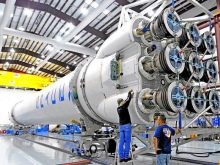All about technical professions

Technical professions are those that inextricably link the activities of a specialist with technology and technology. Behind every simple device or equipment with a complex and intricate device is the responsible labor of a person who works not only on its creation, but also on its further operation, maintenance and repair. Technicians work in the fields of energy, mechanical engineering and construction, in the fuel, space and other industries.
Recently, this list has been supplemented by areas that are related to information technology.


Peculiarities
The more rapidly the world develops today, the more difficult it is to talk about the degree of demand for certain technical professions tomorrow. Some of them, which were recently considered prestigious, are gradually disappearing, and the latest developments in automation are replacing the intellect and human hands. Some specialties are becoming completely unnecessary, giving way to hundreds of others of a new type. In addition, many professions that previously did not have a technical profile are now considered inextricably linked with technology and technology. The main reason for this is to keep pace with progress.
Despite this, workers in technical specialties will always be in demand in the labor market. If earlier in the technical direction, mainly representatives of the male population received development, today, for example, girls can develop successfully in specialties, for example, a programmer or an architect.
A number of qualities are distinguished that will help to successfully realize themselves in the technical field. These include:
- mindset with a bias towards mathematical thinking;
- perseverance;
- clear concentration of attention;
- developed logical thinking;
- analytical ability.


Technical specialties can be obtained at a school, technical school or university. However, a bachelor's or specialist's degree issued by a university is considered more prestigious and allows you to get a higher-paid job. A specialist who graduated from a university automatically moves to a level of more qualified than a specialist who graduated from a technical school, but, as practice shows, this statement is often erroneous.
In addition, employers, when hiring for positions related to computer technology or engineering systems, require compulsory higher education. The university program in technical areas implies the study of complex sciences starting from the first year, as well as a large amount of practical training. The main advantages of working in the field of engineering and technology are:
- demand for specialties;
- decent wages;
- the possibility of part-time work in the presence of free time.
Like any type of activity, such professions involve all sorts of risks - from responsibility for the result of one's own actions to the risk of injury under certain circumstances.


Overview of technical professions
Today, specialists in technical professions work in almost all areas of business, since any of them is characterized by the presence of any technical means. The list of directions and specializations in the field of engineering and technology is quite extensive, however, several main areas of activity can be distinguished, which include hundreds of professions.
- Electric power industry. This industry is one of the most important, since without its uninterrupted functioning it is not possible for all other spheres of industry to work. A significant part of the operations is automated here. However, the processes of production and distribution of energy are one of the most complex, and even the most insignificant power plant will not do without human hands for a long time. Power engineers are now in great demand in the labor market and can boast of good incomes.
- Fuel industry. Fuel in any of its manifestations is a resource that is always and under any circumstances necessary for uninterrupted heat supply. Competent personnel in the field of extraction, processing, as well as logistics of such resources, maintenance of heating equipment will be in demand for many years to come. Specialists in the coal and oil and gas spheres, if they have decent professional qualities, are necessary, and their work is adequately paid.
- Mechanical engineering and metalworking. These areas of heavy industry are closely related to each other and involve the manufacture of various technological machines and equipment, machine tools and devices of different levels. Such processes are quite laborious, both intellectually and physically, and require the appropriate qualifications of personnel, which is necessary not only at the design and construction stages of equipment, but also in the field of regulation and quality management of the final product.
- Automotive industry. This industry includes the development of projects and the production of all types of transport. There is no need to explain the importance of this sector, since it is obvious that any type of vehicle - from consumer to military - will always be in demand. Consequently, the prospects for the development of specialists in various areas of the automotive industry are endless.
- Communication systems and information technologies. These areas are associated with the development and implementation of reliable competitive infocommunication technologies, production technologies and the introduction of electronic communications, as well as methods of storing, processing and transmitting information.
- Space industry. Design and construction of spacecraft, automation of their control systems and many different areas of this technical industry have long been something unattainable and unusual. Space exploration today is an excellent impetus for the transition of human civilization to a new level, and specialists in the field of astronautics are needed to develop fundamentally new instruments for space exploration.
In addition to these fundamental areas of technical activity, there are others that are no less significant for society and the economy of the state. These include:
- building sector;
- medicine and nanotechnology;
- light and food industry and others.
Whichever industry is chosen for professional development, responsible specialists striving to develop professional qualities and skills will always be in demand.



What specialty to choose?
The choice of a profession is a very important stage, and it should be approached with all responsibility. A future specialist needs not only to choose a profession to his liking. It is important that she be highly paid and in demand in the labor market. Each graduate who decides to master one of the technical specialties is given a choice: to go to study after the 9th grade at the Polytechnic College or to enter the institute after the 11th grade.
The first option provides an opportunity to master the basics of the profession and start working immediately after graduating from technical school. Further, if you wish, you can improve your qualifications and get a diploma of higher education by completing your studies at the correspondence department. The second option provides an opportunity for a deeper study of the theoretical and practical foundations of the future profession and obtaining a bachelor's or specialty diploma, which will allow you to apply for a higher-paid position. Which of the options is the best is hard to say. Each has its own pros and cons.
Before choosing a specialty, you should pay attention to labor market trends and analyze what specialties are in demand today and will be in demand in the future., and which are gradually fading into the background. So, as technology develops, many specialties that were relevant yesterday are being replaced by new technologies and are being automated, becoming irrelevant among employers.


Men
Male technical professions involve not only physical labor, but also mental analytical work. Always in demand in the labor market and popular among young men - graduates of technical schools or universities - are:
- environmental engineer, engineer;
- designers and designers;
- production technologists;
- information technology specialists;
- architects and designers.


Women
Despite the widespread belief that technical professions are the prerogative of men, there are quite a few women in industry. Due to the rapid development of technology and process automation, the degree of physical effort applied to certain production processes is decreasing, and gender differences in personnel selection are becoming less significant. Often, all other things being equal, women are given preference because of their high responsibility.
Girls may be interested in such technical professions as:
- programmer or information technologist;
- architect or designer;
- engineer in different directions;
- power engineer or nanotechnologist;
- a specialist in various areas of the food, light or medical industry.
Time makes its own adjustments to the list of technical professions. Every year new ones appear, and some disappear altogether.New specialties require high qualifications and a level of responsibility, which, in turn, requires a high level of education.
Educated specialists of technical specialties will always be in demand in the professional market, since the activities of the most important industrial enterprises that create the country's economy will be supported and improved for many years to come.










